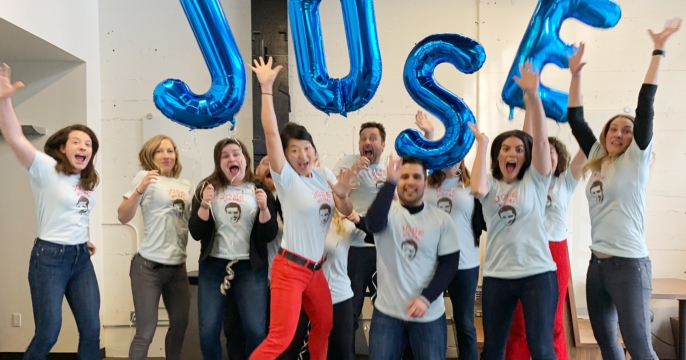
Why Employee Satisfaction Isn’t Enough
For years, the name of the game for managing people was employee satisfaction. With a changing labor market and higher employer standards, that focus is changing.
Success is 99% failure.
- Soichiro Honda, Founder, Honda Motor Corp.
As some of our readers know, Kinesis recently had the good fortune to be awarded as one of Portland's Top 100 Fastest Growing Private Companies. I'm extremely proud of our team, and humbled by the accomplishment.
Interestingly, while this milestone is about "success," I'm interested in the failures and mistakes that we encounter on the road to victory. We celebrate "winners," but I'm more intrigued in how businesses can use failure (or mistakes) to succeed.
 At an early age, Americans are told that mistakes are “OK.” Parents attempt to instill their children with the idea that mistakes are a natural part of the learning process; little Johnny is told that it’s alright to slip up.
At an early age, Americans are told that mistakes are “OK.” Parents attempt to instill their children with the idea that mistakes are a natural part of the learning process; little Johnny is told that it’s alright to slip up.
Yet, as a society, we don’t support this forgiving ideology. As years pass, the tolerance for errors erodes; by the time Johnny enters the workforce, a mistake is viewed as a threat to his career. Indeed, most CEOs rise to power not through avoiding mistakes, but rather by building an ego so powerful that neither they nor those around them will acknowledge error in judgment.
I’d like to propose that perhaps this entire system is wrong. That maybe, just maybe, mistakes aren't so bad after all, and that - when used correctly - these errors can be a competitive advantage.
First, let’s define the type of mistake I’m referring to.
We generally agree that a mistake is when something goes wrong, typically as the result of a human decision or lack of foresight. Sadly, we do a very poor job of delineating big mistakes (like spending $130 million on designing a bridge that’s too short) from smaller mistakes (missing the bus on my morning commute). The English language is simply too monochromatic when it comes to nuancing errors.
Some years back I developed a strategy for determining how important a problem was (and, how upset I should allow myself to become). The formula was simple. I'd ask myself: in a year, will this issue still be affecting my life? And, will this issue still upset me when I think back on it? If the answer was, “no,” then it’s probably a much smaller issue than it first appeared.
Humans tend to thrive on drama, and the drama of the moment often blows things out of proportion. So, when I analyze a mistake, I’ll send it through my, “will it matter in a year?” filter. If the answer is “no,” then it might be the kind of “small mistake” that can yield a benefit.
In the world of business and marketing, mistakes are everywhere. There’s no rule-book for entrepreneurs, and the changing landscape means that what worked yesterday may not work tomorrow. In fact, sophisticated entrepreneurs know that marketing is actually a series of small successes and mistakes, eventually leading to insights and opportunities. Here are 3 ways I’ve learned to gain deeper understanding through mistakes:
A few weeks back, Kinesis made a mistake with two prospective clients. With one client, it was a typo in our contract. With the other client, one of my employees double-booked our conference room.
Now, both of these were what I would call “small mistakes.” And indeed, client #1 (the typo) was very charitable; she admitted she’d done the same thing before, and acknowledged that it’s easy to make that mistake. It was a gracious gesture, and I knew she’d be a great business partner.
Prospect #2, on the other hand, was less forgiving; while I apologized and presented a solution, he used the opportunity to chastise us for attention to detail. While the client might have presented an opportunity in terms of revenue, the small mistake showed that they didn’t align well with our win-win, Build to Last approach. Needless to say, we passed on the engagement.
When I was early in my career, a big part of my job ensured clients’ projects moved from digital design to paper. In the printing industry, especially before many of the modern advances, the opportunities for mistakes were almost infinite. Converting the files to film, proofing the film, converting the film to plates, printing on the press, ink mixes, humidity around the press…on and on. I’m not even sure it was possible to run a complex job without something snagging up.
Back then, we worked almost exclusively with a small print shop; its owner, Tom Mustard, was a legend for his dedication to quality and, “making things right.” When I asked Tom about his attention to detail and customer service he explained it in simple terms: everyone can look good when things are going well; printers are all heroes when there aren’t any problems. What really matters is how you act when projects go off the rails. Do you blame others? Do you blame technology? Do you blame the client? Or, do you look at the situation calmly and ask, “How can I turn this to success?”
While working on the light bulb, Thomas Edison is reported to have failed over 6000 times in his effort to find a working filament. Failures and mistakes surrounded the inventor’s project, yet he's heralded as a genius ahead of his time.
And Edison was not alone; the annals of history are replete with mistakes and failures: Abraham Lincoln lost more elections than he won; Soichiro Honda built an automobile empire on the idea of succeeding only once in every 100 tries; Michael Jordan credits his success to missing over 9000 shots in his career. Great accomplishments seldom (if ever) happen is a flash of genius; they’re the result of hard work, perseverance and – most importantly – fervent dedication.
Let's face it: No one wants to make mistakes. And yet despite the pain of screw-ups and missteps, nearly 40% of business founders cite "previous failure" as a key element to future success. You see, what these leaders know is that not all mistakes are created equal - if you learn to identify the big from the small, the significant from the trivial, you'll not only avoid making the same mistake twice, you'll actually learn more about others, yourself, and the dedication required to become truly great.
Get insights like this straight to your inbox.